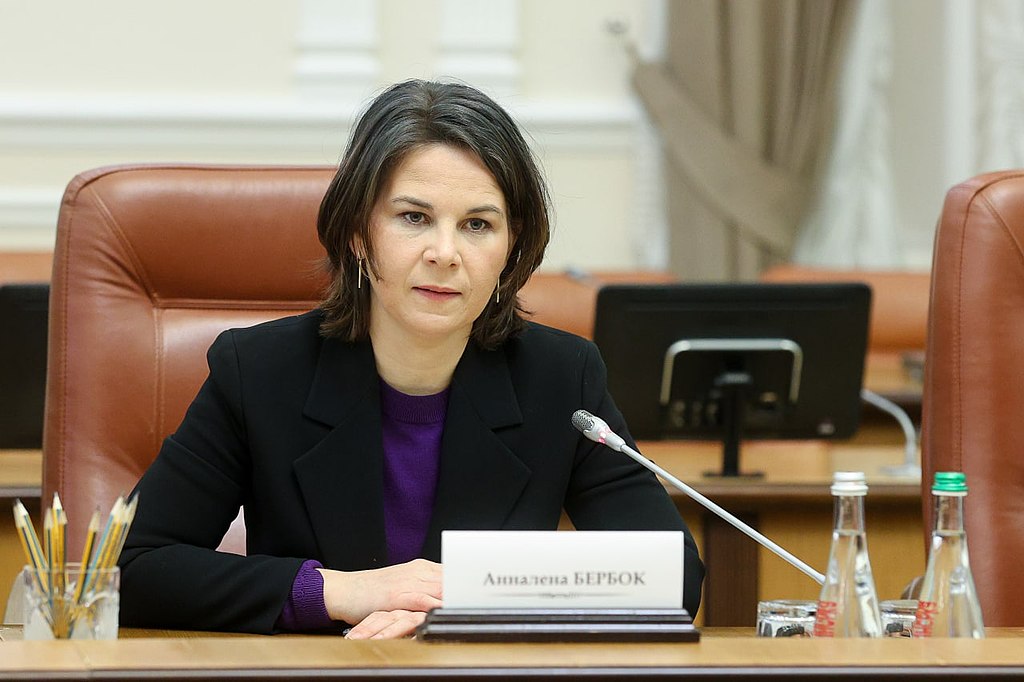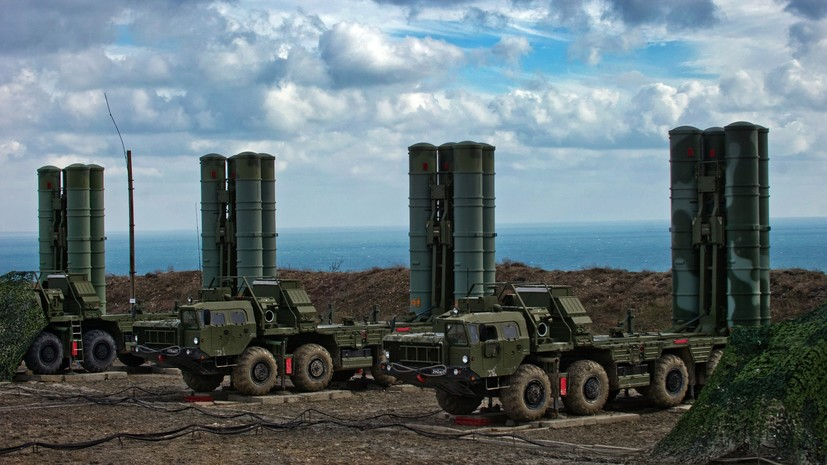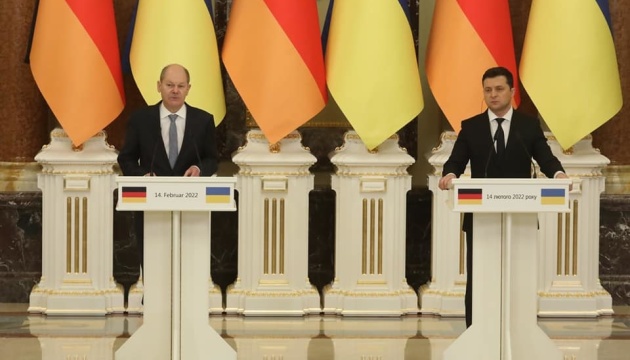German Foreign Minister Annalena Baerbock addressed a special meeting of the German Parliament on Sunday. Her speech is historic for the country, as well as for the rest of Europe. Denouncing Russia’s attack on Ukraine as a war on peace in Europe, freedom, and international law, she emphasized that this war ‘makes it necessary for us to entirely rethink the foundations of our foreign policy.’ She referenced Germany’s previous cautious approach to foreign engagement, but affirmed that at times, one must make an 180-degree turn in one’s foreign policy while being fully conscious doing it. ‘Now is the moment,’ she declared. ‘When our world is different, then our politics must be different as well.’
The day before, the remaining German resistance to aiding Ukraine’s fight against Russia’s invasion fell, and with it, a new era has dawned upon the European landscape. In a joint statement from Baerbock and Vice Chancellor Robert Haebeck, Germany has agreed to a ‘targeted and functional restriction of SWIFT’ against specific Russian banks, allowing the passage of a measure from which they had been the main dissenting voice.
At the same time, Chancellor Olaf Scholz announced that the country was deploying 500 Stinger surface-to-air missiles and 1,000 anti-tank weapons to Ukraine’s frontlines, a decision which followed the announcement that they would also be sending 9 howitzers, 10,000 tons of fuel, 400 rocket-propelled grenades, and 14 armored personnel carriers through NATO allies Poland, Estonia, and The Netherlands.
- Read more: Nazi dreams of an enslaved Ukraine: the blind spot of Germany’s historical memory – Timothy Snyder
Arguments over SWIFT
Leading up to Saturday, there had been international dismay, but not surprise, that Germany (along with Italy, Cyprus, and Hungary) had led the charge in blocking the exclusion of Russia from the SWIFT banking system as one of the sanctions proposed in response to the country’s invasion of Ukraine. SWIFT (which stands for Society for Worldwide Interbank Financial Communication) is a global payments transfer system which facilitates transactions for over 11,000 institutions. Exclusion from it would place immense hardship on a country’s financial operational capabilities, and it has been likened to a nuclear-level economic sanction. For Russia, a nation dependent on energy exports in foreign currencies, such a sanction would deliver an especially harsh blow to the economy.
Previously, German Chancellor Olaf Scholz suggested that exclusion from SWIFT should be saved ‘for a situation where it may be necessary.’ Failure to include this measure had elicited sharp criticism from both international figures such as Donald Tusk, former Polish Prime Minister and European Council President (who tweeted that the countries who opposed the measure had ‘disgraced themselves’), as well as from politicians from within Germany itself.
However, anyone familiar with the history of Germany’s foreign policy will be aware as to how tightly woven it is with the nation’s robust economic interests and perhaps why the country opposed the SWIFT option for so long: Russia supplies Germany with nearly 55% of its natural gas and about 42% of its oil.
The Nord Stream 2 saga
In early February, when Olaf Scholz traveled to Washington for an inaugural meeting with Joe Biden, he appeared restrained and said little more than Western allies were unified in their response to Russian aggression. Most importantly, he declined to elaborate on whether the threatened sanctions from Western allies would include blocking Nord Stream 2—the $11 billion gas pipeline which runs directly from Russia to Germany under the Baltic Sea and is set to deliver more than 55 billion cubic meters of natural gas—either during the joint press conference with Biden or later during an interview on CNN with Jake Tapper.
According to a Ukrainian source, a meeting between Foreign Minister Baerbock and Ukrainian President Volodymyr Zelenskyy was even cancelled due to the Foreign Minister’s refusal to confirm the pipeline as part of the sanctions package (Berlin has denied this, citing scheduling conflicts as the reason).
Germany has long been accused of harboring a conciliatory attitude to Russia, a stance dating back to the 1969 changeover from Konrad Adenauer’s more combatitive CDU-led West German government towards a more co-operative approach headed by former-SPD Berlin mayor Willy Brand. This strategy, entitled Ostpolitik, dispensed with the hitherto enforced Hallstein Doctrine which mandated a cessation of diplomatic ties with any country recognizing the legitimacy of the Deutsche Demokratische Republik (DDR), the eastern area of Germany which became annexed by Soviet forces following WWII and later became a Soviet satellite state.
In 1970 and 1972, Brandt signed three treaties legitimatizing relations with the DDR. The main thrust of Ostpolitik was to facilitate interactions between the two sides through means of cross-border commercial interests, and the idea that peace would be the logical outcome of increased trade is a belief which has formed a cornerstone of German ideology ever since. It is why former Chancellor Angela Merkel has always insisted that the pipeline is a purely economic consideration, entirely outside the sphere of political discourse.
- Read also: Germany exports dual-use products to Russia despite EU sanctions, beefing up Russian military
A collapse of Ostpolitik
The gentle erosion of Ostpolitik into a policy focusing intently on economic interest has been laid bare during these past months, however. The fact that Ukraine stood to lose an annual $2 billion in gas transit fees once Nord Stream 2 became operational, a key source of income for the country, was countered by a European Parliament paper which stated that replacing Ukrainian inland pipes could cost over $17 billion, while the entire construction of Nord Stream 2 pipeline would run to several billion less.
This Ostpolitik focus on foreign policy through commerce and trade was further complicated when it was revealed that upon leaving office in 2005, former SPD Chancellor Gerhard Schroeder would be nominated as head of the shareholders' committee for the Nord Stream 2 company, a position for which he earned €250,000 a year, and which led to him becoming Chairman of the Board in 2016. The apparent fusion of German business affairs with its politics was complete when Schröder, who is scheduled to join the board of the Russian state-owned energy company Gazprom in June, recently gave an interview in which he accused Ukraine of ‘sabre-rattling’ (a statement for which he was roundly denounced by German politicians across all parties, including the SPD).
At the same time, Chancellor Scholz has highlighted the role of finance within German foreign affairs, repeatedly stressing that Germany is the second largest donor of aid to Ukraine (following the United States), spending over $2 billion since 2014. He emphasized this point following criticism Berlin has received over the country’s unwavering refusal to supply armaments to Ukraine. Germany’s long-standing policy of not sending weapons to conflict areas is based upon pacifist intentions derived from their history in the Second World War.
In January, the Ministry for Economic Affairs and Climate Action reported that Germany’s weapons exports hit a high of $10.65 billion (€9.35 billion) in 2021, which represented an increase of 61% from the previous year. The main bulk of this increase—which was a record for the nation in arms exports—came from sales made to Egypt, which, for three years running, received more weaponry from Germany than from any other country.
Omid Nouripour, a fellow member of Baerbock’s Green Party, has recently admitted that the moral position of Germany regarding the sales to Cairo is difficult, considering the country’s human rights record and the more than 60,000 political prisoners held in Egypt.
Prior to Egypt, the main destination for German arms exports such as cruise missiles was South Korea (from 2013-2017), a nation which has been engaged in heightened tensions with a nuclear-fortified neighbor to the North on the Korean Peninsula.
Germany has also blocked other nations from sending weapons to Ukraine, after Estonia, Lithuania, and Latvia pledged joint assistance to aid the country in its defense. Estonia’s contribution of D-30 howitzers was forbidden because the weapons were originally based in the former East Germany. Following the fall of the USSR, the howitzers were sold to Finland, who, in 2009, sold them to Estonia for 31 million kroons. Part of the purchase arrangement, however, entailed Berlin’s approval regarding further resale, an approval which Berlin denied.
International censure has been unequivocal. In January, Latvian Defense Minister Artis Pabriks decried Germany’s actions in an interview with the Financial Times, branding its stance as both ‘immoral and hypocritical.’
The horrifying reality of bombs exploding over Ukraine’s skies luridly illuminates the contradictions inherent in the twenty-first century contortions of Germany’s foreign policy.
Perhaps the most devastating summation of this emotionless fixation on cost-analysis came on Thursday night, during a political discussion moderated by German television host Markus Lanz.
Andrij Melnyk, the Ukrainian ambassador to Germany, said that he had been moved to tears for the first time in many years by the day’s events, not just by what was occurring in his country, but by the ‘coldness and indifference’ of the German politicians with whom he had spoken.
Approaching some ministers with renewed pleas of military equipment and fuel for the outnumbered troops in Ukraine, Melnyk related how these colleagues had merely informed him that in their calculated estimation,
In his interview last month, Artis Pabriks declared that Germany’s stance was ‘driving a division line between west and east in Europe.’ This week, President Zelenskyy stated that a new Iron Curtain is being erected. Germany, as a nation, is still haunted by the specter of a wall which divided its terrain for decades.
It is a recognition that will stand as a defining moment in European history as the world watches war return, once again, to the European continent.
On Friday, former Defence Minister Annegret Kramp-Karrenbauer publicly admitted Germany’s grave complicity in the years-long lead-up to this week’s invasion, confessing, ‘I’m so angry with us because we've failed historically.’ At a news conference in Vilnius following Chancellor Scholz’s announcement, Lithuanian President Gitanas Nauseda commended the momentousness of Berlin’s decision: ‘It’s a breakthrough for this key European state and that’s something we need to appreciate.’
The rewriting of Ostpolitik will not occur overnight, but on Saturday the remaining, missing bricks were inserted into a new wall, the now unified wall of Western condemnation of this war on Ukraine. Germany, along with the rest of Europe, faces a new dawn.
Read More:
- A “Stockholm syndrome” with long roots: experts explain how to counter Russian influence in Germany
- Demands to sanction Putin’s German agents of influence as Chancellor Scholtz visits Ukraine
- Germany exports dual-use products to Russia despite EU sanctions, beefing up Russian military
- German security assistance to Ukraine perpetually on hold
- Why does Germany refuse to export arms to Ukraine?
- “Germany bears a special responsibility for European security”: Ukrainian Jews appeal to Chancellor Olaf Scholz
- 73 East Europe experts call on Germany to “fundamentally correct” Russia policy
- How German companies violated sanctions to bring Dutch sea platform to luxury marina in Crimea
- “A second Budapest memorandum”: experts on the US-Germany Nord Stream 2 deal
- From information laundering to influence: Russia’s footprints in Germany
- Germany strengthens Russia’s insolence with new economic agreement
- Putin regime has set up not one but five ‘fifth columns’ in Germany, Eidman says
- Putin actively using Cold War Stasi agent network in Germany, Reitschuster says
- Crimean factory gets generators from German company in breach of EU sanctions – media
- Germany, Norway deliver ilmenite ore to occupied Crimea in sanctions breach
- Nazi dreams of an enslaved Ukraine: the blind spot of Germany’s historical memory – Timothy Snyder





